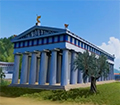|
|
|
|
|
|
 |
Archaeological Museum of Olympia – Before going out to the ruins, first stop into the archaeological
museum. Check out the model of the complex, what the buildings
at Olympia looked like in all their glory. |
|
|
|
| |
|
The museum has a gorgeous collection of things found at Olympia
– birds and animals in fantastic shapes, bronze helmets, Gorgon shields,
scads of little tiny votive figures found around the altar of Zeus. Plus
the exquisite statue Hermes by Praxiteles (holding a little tiny Dionysius),
and lovely draped ladies in Roman statues, sections of the magnificent frieze
from the Temple of Zeus – legends of the Twelve Labors of Hercules
and Battle of the Lapiths and Centaurs. |
|
|
|
|
|
|
|
|
|
|
|
 |
|
|
|
|
|
|
|
Before you visit Olympia, download this app with 3D images of the complex, audio tour, and itinerary of games events, day by day. App is free. |
|
|
|
| |
|
Ancient Olympia (iPhone) |
|
|
|
| |
|
Ancient Olympia (Android) |
|
|
|
|
|
|
|
 |
|
|
|
|
| |
|
 |
As you start into the ruins, on your right, you'll see the Palestra, the wrestling school. Kids can run around among the double
sets of columns (this was once roofed over), enclosing the quadrangle. |
|
|
|
|
| |
|
 |
A little further down, step up the high steps into what was
originally the workshop of Phidias, the sculptor of the gigantic
Zeus statue in the Temple of Zeus. The last games were held in Olympia in 393 A.D., and in later centuries,
the buildings were ransacked by various invading hordes, and used for other
purposes. |
|
|
|
|
| |
|
 |
Next stop, check out the Leonidaion, accommodations for important guests at the games. In the center, you can see
the remnants of the fancy water garden, a later addition by the Romans.
During the Roman era, guests at the Leonidaion had a perfect view of the
processions and ceremonies over at the sacred precinct. |
|
|
|
|
|
|
 |
Ascend the stairs into the Altis, the sacred precinct, dominated
by the Temple of Zeus.A lone column gives
you a sense of the massive size of the Temple of Zeus, but the broken column
sections on the ground are even more impressive. |
|
|
|
|
| |
|
|
Inside the Temple was a
gigantic statue of Zeus, 43 ft. high, covered in ivory and gold, and one
of the seven wonders of the ancient world (needless to say, later this statue
was carted off, and not a bit remains). |
|
|
|
|
| |
|
|
Also in the Altis, the Temple of Hera, the oldest temple at Olympia,
the Nymphaion of Herodes Atticus, a Roman fountain construction, and bunches
of little treasuries, where gifts to Zeus were stored. |
|
|
|
|
|
|
 |
By now, you'll want to head out to the Stadium, where
the running races were held. The stadium looks familiar – a long dirt
field, with a grassy embankment on either side for the spectators. |
|
|
|
| |
|
When we
were there, a group of ten teenagers were energetically running the length
of the field, cheered on their classmates. |
|
|
|
|
 |
 |
|
|
|
Olympia was most important site of Olympic Games, and Temple of Zeus a Wonder of the World, but how to make un-restored ruins come alive for kids? Take a private walking tour with a local guide: |
|
|
|
|
| |
|
 |
Olympia Private Local Lour |
|
|
|
|
 |
 |
|
|
|
|
|
|
|
|
| |
|
|
 |
|
Find out about
the first Olympic games and ancient Greeks – who could compete,
training for the games, the Olympic grounds, running, chariot and
horse races, javelin and discus contests, wrestling, boxing and
pankration matches. Packed with historical illustrations and photos,
perfect to bring on your trip. (Easy reader)
|
|
|
|
|
|
| |
|
|
|
The
magic tree house drops Annie and Jack into ancient Olympia, where
they meet Plato and a lady poet, but Annie gets into big trouble
when she sneaks into the Olympic Games. (Easy reader)
|
|
|
|














